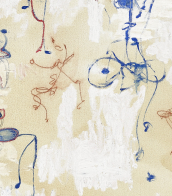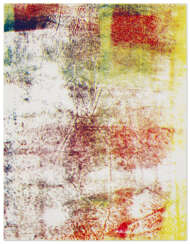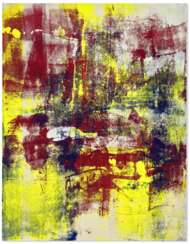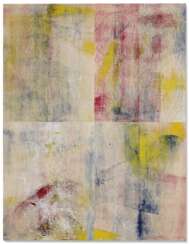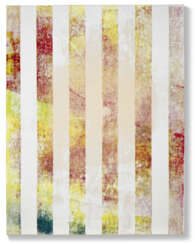Israel Lund (1968) — Auction price

Israel Lund is a conceptual painter based in Brooklyn, New York. He creates acrylic paintings using a combination of digital and analog techniques including silk-screening; digital painting; and the manipulation of photocopies, photographs and PDFs through smartphone applications. His practice has been described as its “own distinctive kind of post-digital abstraction.”
Lund's work concerns the “modularity and scalability” of analog painting. As described by critic and art historian Alex Bacon, Lund's paintings evoke an uncanny “screen-space” that is produced in an “analog-mode” via a silk-screening process, a concept that the artist refers to as “analog.jpg”. In his recent work, this process involves imprinting the palette knife through a silk screen onto the warp and weft of raw, coarse canvas. The result is a dappled or “pixelated” miasma of cyan, magenta, and yellow.
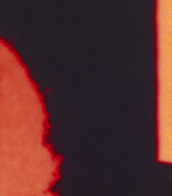

Israel Lund is a conceptual painter based in Brooklyn, New York. He creates acrylic paintings using a combination of digital and analog techniques including silk-screening; digital painting; and the manipulation of photocopies, photographs and PDFs through smartphone applications. His practice has been described as its “own distinctive kind of post-digital abstraction.”
Lund's work concerns the “modularity and scalability” of analog painting. As described by critic and art historian Alex Bacon, Lund's paintings evoke an uncanny “screen-space” that is produced in an “analog-mode” via a silk-screening process, a concept that the artist refers to as “analog.jpg”. In his recent work, this process involves imprinting the palette knife through a silk screen onto the warp and weft of raw, coarse canvas. The result is a dappled or “pixelated” miasma of cyan, magenta, and yellow.
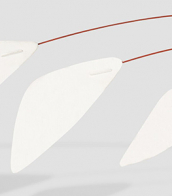

Israel Lund is a conceptual painter based in Brooklyn, New York. He creates acrylic paintings using a combination of digital and analog techniques including silk-screening; digital painting; and the manipulation of photocopies, photographs and PDFs through smartphone applications. His practice has been described as its “own distinctive kind of post-digital abstraction.”
Lund's work concerns the “modularity and scalability” of analog painting. As described by critic and art historian Alex Bacon, Lund's paintings evoke an uncanny “screen-space” that is produced in an “analog-mode” via a silk-screening process, a concept that the artist refers to as “analog.jpg”. In his recent work, this process involves imprinting the palette knife through a silk screen onto the warp and weft of raw, coarse canvas. The result is a dappled or “pixelated” miasma of cyan, magenta, and yellow.
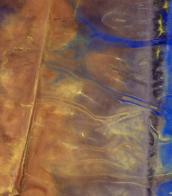

Israel Lund is a conceptual painter based in Brooklyn, New York. He creates acrylic paintings using a combination of digital and analog techniques including silk-screening; digital painting; and the manipulation of photocopies, photographs and PDFs through smartphone applications. His practice has been described as its “own distinctive kind of post-digital abstraction.”
Lund's work concerns the “modularity and scalability” of analog painting. As described by critic and art historian Alex Bacon, Lund's paintings evoke an uncanny “screen-space” that is produced in an “analog-mode” via a silk-screening process, a concept that the artist refers to as “analog.jpg”. In his recent work, this process involves imprinting the palette knife through a silk screen onto the warp and weft of raw, coarse canvas. The result is a dappled or “pixelated” miasma of cyan, magenta, and yellow.
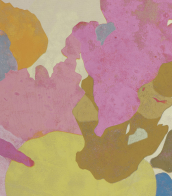

Israel Lund is a conceptual painter based in Brooklyn, New York. He creates acrylic paintings using a combination of digital and analog techniques including silk-screening; digital painting; and the manipulation of photocopies, photographs and PDFs through smartphone applications. His practice has been described as its “own distinctive kind of post-digital abstraction.”
Lund's work concerns the “modularity and scalability” of analog painting. As described by critic and art historian Alex Bacon, Lund's paintings evoke an uncanny “screen-space” that is produced in an “analog-mode” via a silk-screening process, a concept that the artist refers to as “analog.jpg”. In his recent work, this process involves imprinting the palette knife through a silk screen onto the warp and weft of raw, coarse canvas. The result is a dappled or “pixelated” miasma of cyan, magenta, and yellow.
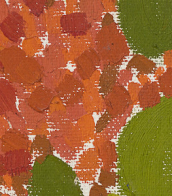

Israel Lund is a conceptual painter based in Brooklyn, New York. He creates acrylic paintings using a combination of digital and analog techniques including silk-screening; digital painting; and the manipulation of photocopies, photographs and PDFs through smartphone applications. His practice has been described as its “own distinctive kind of post-digital abstraction.”
Lund's work concerns the “modularity and scalability” of analog painting. As described by critic and art historian Alex Bacon, Lund's paintings evoke an uncanny “screen-space” that is produced in an “analog-mode” via a silk-screening process, a concept that the artist refers to as “analog.jpg”. In his recent work, this process involves imprinting the palette knife through a silk screen onto the warp and weft of raw, coarse canvas. The result is a dappled or “pixelated” miasma of cyan, magenta, and yellow.
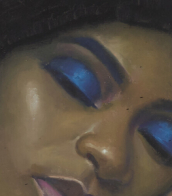

Israel Lund is a conceptual painter based in Brooklyn, New York. He creates acrylic paintings using a combination of digital and analog techniques including silk-screening; digital painting; and the manipulation of photocopies, photographs and PDFs through smartphone applications. His practice has been described as its “own distinctive kind of post-digital abstraction.”
Lund's work concerns the “modularity and scalability” of analog painting. As described by critic and art historian Alex Bacon, Lund's paintings evoke an uncanny “screen-space” that is produced in an “analog-mode” via a silk-screening process, a concept that the artist refers to as “analog.jpg”. In his recent work, this process involves imprinting the palette knife through a silk screen onto the warp and weft of raw, coarse canvas. The result is a dappled or “pixelated” miasma of cyan, magenta, and yellow.
